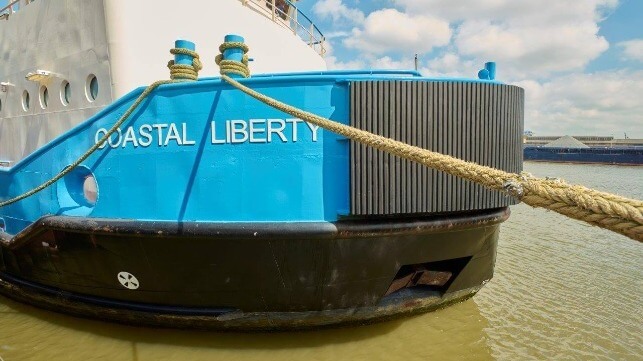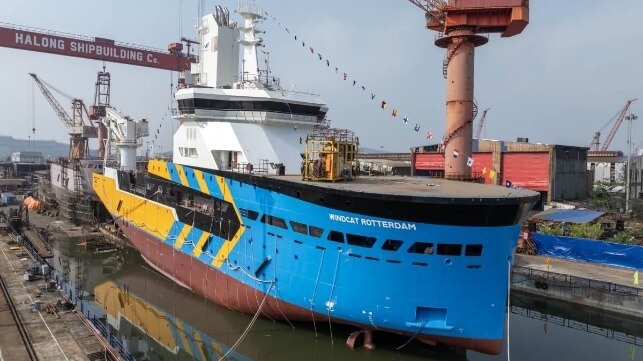OSV Coastal Liberty Operates on Green Hydrogen in the German Wadden Sea

[By: eCap Marine]
In a significant step towards sustainability and emission-free energy sources on board, Offshore Supply Vessel Coastal Liberty has set sail on the waters of the Wadden Sea. With the clear aim of minimising the environmental impact of its activities and driving forward the energy transition, the shipping company has decided to switch to green hydrogen as its main source of energy.
End of February 2024 the refitted OSV received class certification by DNV for its newly installed hydrogen system on board. eCap Marine, contracted by Offshore Service Gesellschaft mbH, engineered the system enabling the vessel to operate without producing any emissions using hydrogen and batteries.
A safe hydrogen-electric power system
Over two years, eCap Marine developed a containerized system featuring two Ballard FCwave (2x200kW) fuel cells, a maritime battery system from Lehmann Marine, a fire
extinguishing system, tank units, a custom power management system, and all necessary cooling and safety equipment.
Lars Ravens, Managing Director of eCap Marine, states that this kind of system is a unique installation on board a seagoing ship and scalable up to megawatt-sized designs for larger commercial ships and longer voyages as well as smaller inland vessels.
Local hydrogen production
The green hydrogen for the installed fuel cells will be produced locally and sustainably, using offshore wind power on a electrolyser hydrogen plant a few kilometers from the vessel’s berth that was installed simultaneously to the fuel cell project. The electrolyser is designed to expand in case of a higher demands. eCap Marine designed the three swappable high pressure tank systems with the focus on safety, and in alignment with the rules and regulations resulting to the transport of the units between the vessel and the electrolyser by truck. eCap’s Head of Projects Frederike Engels confirms that switching, disconnecting and reconnecting the hydrogen tanks is very easy and safe, taking just a few minutes due to the toolless design and standard connections for crane and truck.
For the vessel’s crew the new system means reduced vibrations on board and a more direct propulsion allowing immediate response to the propeller shafts. Jochen Kaufholt, CEO of Offshore Service Gesellschaft, describes the Coastal Liberty a first of its kind and a flagship for the maritime energy transition in Europe.
eCap Marine firmly believes that this investment will not only have a positive impact on the environment but will also bring long-term benefits for its customers and society as a whole.
The products and services herein described in this press release are not endorsed by The Maritime Executive.
Windcat’s First CSOV Launched by Damen

[By: Damen Shipyards Group]
Damen Shipyards, Windcat and CMB.TECH are celebrating the launch of the first of six Commissioning Service Operation Vessels (CSOV). The launch marks the inauguration of Windcat’s ‘Elevation Series’ of future-proof offshore wind farm maintenance and support vessels, which have been designed in close collaboration with Windcat and CMB.TECH. The launch ceremony took place on 12 October at Ha Long Shipyard in Vietnam, where Damen is constructing all six CSOVs. With this first CSOV in the water, Damen will continue with its outfitting and commissioning operations to prepare the vessel for delivery in Q2 2025.
Damen, Windcat and CMB.TECH first announced their intention to develop and build a series of offshore wind farm support vessels together back in 2022. After an initial contract for two ships, Windcat increased the order to six vessels, with the last contract being signed mid-2024.
Talking shortly after the launch of this widely anticipated first example of ‘Elevation Series’ CSOV, Windcat Managing Director Willem van der Wel said: “We have been working with Damen towards this day for some years now and to see the first CSOV glide into the water was truly a special moment. We are excited for this first vessel to hit the water today and look forward to introducing this game-changing vessel to the world next year.”
Compared to earlier designs of offshore wind farm support vessel, this CSOV represents advances in efficiency, performance and comfort. The 87-metre long vessel is designed around best in class offshore performance, with various new technologies on board to achieve this. The vessel will accommodate up to 120 people on board, remaining at its offshore location to provide in-field technical and maintenance support for up to 30 days at a time. Particular attention has been given to provide offshore personnel with the most comfortable conditions to live and work during their time on board.
“We are especially proud of the efficiency gains that this vessel is expected to deliver,” added Damen Sales Manager Benelux Joost van der Weiden. “The hybrid-electric propulsion system coupled with an efficient power distribution system means that there will be no need to run a backup diesel generator and the vessel will never use more power than necessary. And we have optimized the thruster configuration, enhancing the dynamic positioning during transfer operations. All in all, we expect innovations like these to add up to substantial reductions in fuel consumption and, therefore, emissions.”
Reducing CO2 emissions further, the Damen / Windcat / CMB.TECH cooperation has taken a proactive stance on the subject of future fuels. The consequence of this is that, thanks to CMB.TECH’s dual fuel hydrogen technology, the entire series of six vessels will be able to use hydrogen as a fuel, increasing this hydrogen use as the energy market progresses.
Video
A short video about the launch is available here.
The products and services herein described in this press release are not endorsed by The Maritime Executive.
No comments:
Post a Comment